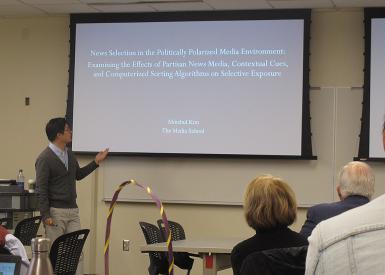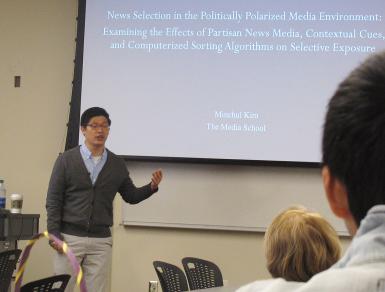Kim research examines how users select news

Common assumptions suggest that news consumers tend to select the news they view based on ideological positions of news outlets, according to doctoral candidate Minchul Kim. However, this correlation is not totally consistent or straightforward.
Kim addressed these topics in his talk, “News Selection in the Politically Polarized Media Environment: Examining the Effects of Partisan News Media, Contextual Cues and Computerized Sorting Algorithms on Selective Exposure” April 28.
Kim’s research is the first to be funded through the Kern Scholarship for Innovation in Journalism established last year by alumnus Gerry Kern, BA’71, former editor of the Chicago Tribune, and his wife, Jewell. Kim’s talk was part of the school’s Friday research talk series, and the Kerns were in attendance.
Kim said he first looked at computerized algorithms and polarizations when his girlfriend became interested in news apps on her iPhone.
“She became an avid news reader, which is surprising to me, no offense to her, because she was indifferent to it before,” he said.
Kim noted that apps provide news even when users don’t ask for it. What was even more interesting, he realized, was that his news on his phone appeared slightly different from hers—articles were in different sets and orders.
“This made me curious as to what are the consequences on society,” he said.
From there, Kim established research questions: How do people choose news in the current media environment? Do computerized algorithms change the way people choose news?
He used data from 754 participants on Amazon Mechanical Turk to test the impact of sorting algorithms in news headlines and sets, specifically testing whether sorting algorithms affected how contextual clues function in helping readers select news.
Those tested most often selected the BBC, New York Times and Wall Street Journal as news sources. The least selected sources were the Blaze, Fox and Breitbart.
“This was not surprising, as 61 percent of the respondents were Democrats,” Kim said.
However, political ideology did not have a significant impact on news selection when compared to other factors, such as general interest level of news.
“Participants did not actually avoid incongruent news,” he said.
This does not mean that sorting algorithms do not impact news consumption, Kim said, but that this impact is not limited to political leanings.

“This study is basically analyzing the impact of system versus human behavior,” he said.
Kim said he would like to continue this research in studying other cues that may affect news selection, like size of headlines and issue relevance sorting. This would require follow-up experiments.
Associate professor Jae Kook Lee, who mentored Kim in this research, agreed with the prospect of continuing the study.
“Maybe you can predict some algorithm which you can adjust the context or the headline, which may have some effects,” Lee said.
Kim said focus news consumers put on news selection is the most significant takeaway from the research.
“Once we provided a certain set of news, they chose news based on interestingness of headlines,” he said. “Once news is interesting, they were willing to choose news sources that they don’t agree with. That, I think, is the most interesting thing here.”
More:

